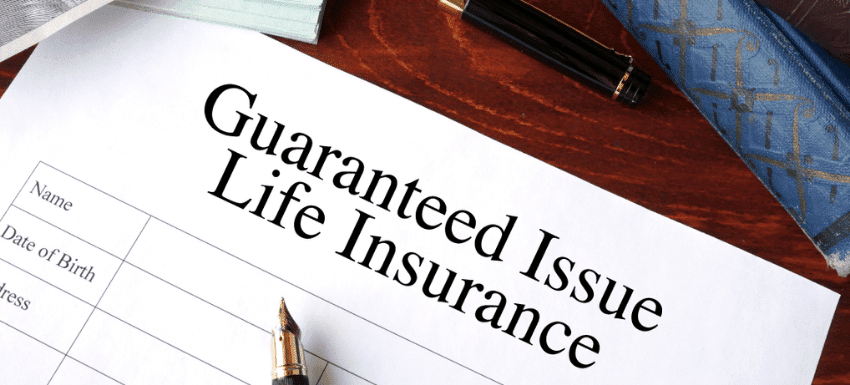
Have you ever heard of life insurance with assured issues? Anyone can purchase this kind of insurance, regardless of their medical history.
We’ll go through what this kind of policy is, who it’s ideal for, and how much coverage you can anticipate in this piece.
We’ll also examine some of the advantages and disadvantages of purchasing guaranteed issue life insurance. Therefore, continue reading if you’re considering purchasing insurance or simply want to understand more about it!
What is life insurance?

A contract between you and a life insurance provider is known as a life insurance policy. They agree to pay a death benefit (a lump sum of tax-free money) to someone you pick if you die. In exchange, you agree to pay them an insurance premium on a regular basis: (a small amount of money over time).
You and your partner decide on the quantities of money coming in and out, as well as the time frames involved, but that’s it in a nutshell.
What can a life insurance claim payment be used for?
Your beneficiary (the person you choose to receive the payout) is allowed to utilize the death benefit from your life insurance in any way they see fit. The death benefit is exempt from taxation. They can put the money towards:
- Covering day-to-day expenses so that their family can maintain a similar standard of living (groceries, bills, rent, etc.)
- Pay off your credit card debt (mortgages, lines of credit, credit card bills, business loans, etc.)
Invest in the education of their children. - Make a significant donation to their favorite charity.
- Make arrangements for their funeral.
- Keep their company safe.
If you don’t choose a beneficiary, the death benefit will be paid to your estate, which may be subject to taxation.
What are the different types of life insurance in Canada?
Life insurance is divided into two types: term and permanent (or whole life insurance). Both whole life and permanent life insurance offer advantages and disadvantages, but the vast majority of Canadians (76 percent) choose for term insurance, either individually or via their company as part of a group plan.
Term life insurance
Term life insurance guarantees that if you die, we’ll pay out, but only if you die within a certain time frame, or ‘term.’ These terms are usually 10, 20, or 30 years long, but you can opt for shorter or longer terms, as well as coverage that lasts until a certain age.
Whole life insurance
Whole life insurance is a type of insurance that covers you for the rest of your life and has a monetary value. Whole life policies may also provide dividends dependent on the profits of the insurance company. It’s referred to as “participating insurance.”
Limited-pay whole life insurance
Limited-pay insurance is comparable to whole-life insurance, except the payment schedule is shorter. For example, if the term is 20 years, your insurance is assured for life and you are no longer responsible for premiums. The most expensive policy choice is usually this type of coverage. This is because premiums are paid in advance to compensate for the years when you will not be paying.
Universal life insurance
Universal life insurance is similar to whole life insurance, except that you have additional options for investing your cash value. If you’re a smart investor, you can get a better return than you would from a standard whole life policy. However, it necessitates that you keep a close eye on the cash value investments you’ve made. Alternative investment options may assist you in achieving your financial objectives more quickly.
Term to 100 life insurance
Term to 100 is a whole life insurance policy that insures you until you die, despite the term in the name. The distinction is that this policy has no cash value or investment component, resulting in lower premiums. In addition, if you live to be 100 years old, you will no longer be obliged to pay premiums and will retain your coverage. Canada is the only country that offers term to 100 life insurance plans.
Annual renewable term life insurance (ART)
Annual renewable term life insurance (ART) is a less common life insurance alternative for consumers looking for short-term life insurance coverage. ART is accessible on an annual basis with the option of renewal and can help those who are unemployed, want to improve their health before committing to longer-term coverage or are in debt.
Do I need life insurance?

Perhaps a better thing to ask is whether or not the people in your life require it.
Insurance is used to pay off debts (personal or business-related) and provide a source of income to someone who relies on you but is no longer alive.
By purchasing life insurance, you can secure assets for your family’s future by investing in a secondary source of income. Without life insurance and the security of a death benefit, you’re putting all of your family’s financial eggs in one basket: your ability to produce an income while you’re alive.
You may believe you have life insurance through your employer’s group benefits, but such policies must be scrutinized carefully to ensure they cover all of your needs.
How much life insurance do I need?
You should purchase the most comprehensive life insurance policy you can afford. When they die, most people want to leave a multimillion-dollar fortune to their family and loved ones. However, most people are unable to do so due to budgetary constraints.
Determine what you consider to be an “affordable premium.” Create a budget to examine your family’s existing and future financial needs, as well as your current liabilities and debts, as well as any costs related to your death. This will show you what kind of coverage you should get and how much it will cost.
When should I buy life insurance?
Life events necessitate the purchase of life insurance. Purchasing a home, having children, and marrying are all signs that you have people in your life who rely on your salary to maintain their standard of living. Because insurance premiums climb as you get older, buying it earlier in life can save you money.
What is the guaranteed issue life insurance?

A type of permanent life insurance is guaranteed issue life insurance. Because there is no medical underwriting, it is also known as “no medical exam life insurance.” For qualification, there are no medical exams or health questionnaires required, and coverage is assured.
What then is the catch? Compared to conventional life insurance plans, the premiums are much higher. Additionally, the death benefit is typically insufficient to pay off minor debts and end-of-life obligations. Last but not least, guaranteed issue insurance requires a minimum 2-year waiting period before paying out.
Life insurance with guaranteed acceptance has some benefits. It aids some Canadian adults in resolving particular issues. If so, guaranteed issue life insurance may be the best option for you in Canada.
Who is Guaranteed Issue Life Good For?
Guaranteed issue life insurance can provide life insurance to certain people who need life insurance but don’t have any other options. They might want to leave money to their heirs so they can cover funeral or other final costs. Or maybe they want to leave a modest legacy for their offspring or grandchildren. This kind of life insurance can benefit:
- Have medical conditions that would make it impossible or unaffordable to buy other types of life insurance such as whole life insurance
- Have limited budgets for life insurance
- Are OK with having only a small amount of life insurance coverage, such as $25,000
There are other, better options if that’s not you. Higher coverage amounts may be available through policies like universal life insurance (much higher, into the millions). These alternative choices could necessitate a life insurance medical examination, but they will eventually offer the most affordable rates. Additionally, there are more and more possibilities for no-exam life insurance, particularly for those who purchase term life insurance.
How does guaranteed issue life work?
The majority of life insurance policies demand some sort of medical evaluation. The results of examinations, blood tests, medication histories, and other tests are used by medical underwriting to assess the applicant’s health. The decision regarding whether to accept or reject the insurance application will be made by an underwriter who is knowledgeable about health issues and how to interpret test findings.
The applicant’s premium for the insurance is determined by the rating class that the underwriter also assigns. Customers can pay premiums that are appropriate for their health status thanks to medical underwriting. Generally speaking, healthy people earn less than unhealthy ones.
Guaranteed issue policies don’t need as much underwriting data as other types of policies. A guaranteed life insurance policy will therefore cost more than one that has been medically underwritten. That represents the compromise for getting rid of the exams and testing for health.
Many life insurance policies have coverage limits of $1 million or higher. However, the maximum amount of insurance under guaranteed issue contracts is sometimes $50,000 or even $100,000.
What you need to know about graded benefits

One of the biggest disadvantages of guaranteed issue life insurance, aside from the higher premiums, is that your beneficiaries wouldn’t receive the full death benefit until the policy has been in existence for a predetermined period of time (typically between one or two years, depending on the life insurance company). This is referred to as graded benefits in the insurance sector.
The majority of life insurance companies will typically provide your beneficiaries a refund of your premium payments instead of the real death benefit if you pass away in the first few years of your policy. This method, according to Investopedia, avoids significant payouts being made right away to terminally ill people who might want to enroll in a policy only in time for their loved ones to get a death benefit.
Guaranteed issue life insurance is not the sole choice for people with pre-existing conditions if you have one. Insurance company policies differ, however some may cover those with chronic diseases. If you have a pre-existing ailment, find out more about your alternatives.
Benefits
Guaranteed acceptance of life insurance offers three main benefits:
- No medical underwriting
You don’t have to take a medical test or answer questions about your health to get approval.
- Guaranteed approval
Since there is no medical underwriting, practically all applicants are accepted. This makes it a viable choice for those who are ineligible for other types of life insurance. Some life insurance is better than none, despite the fact that the death payout is modest.
- Fast approval
The approval process for a typical life insurance policy might take up to six weeks. In comparison, a guaranteed issue plan allows you to receive the insurance in no more than 2-3 days.
Drawbacks
Here are the main drawbacks.
- Higher premiums
When you sign up for a standard life insurance policy, the life insurance company bases the rates it charges on the medical data it gathers from a medical exam and health questionnaire. However, as was previously stated, guaranteed issue policies do not require medical underwriting. Carriers make up for their ignorance of you by imposing higher premium fees.
- Small coverage amounts
The offered guaranteed issue death benefit amounts are often quite small, rarely exceeding $25,000. Because of this, individuals frequently get such a plan if they simply need final expense coverage.
- Graded death benefits
The waiting period for all assured acceptance life insurance policies is at least 24 months long. The carrier won’t pay you a death benefit in the event that you pass away during this time. Instead, it will reimburse your beneficiary for the premium amount you’ve already paid plus interest.
What to Know About Guaranteed Issue Life Insurance
Here’s what you need to know if, after examining your options, you decide that guaranteed issue life insurance is the best choice for you.
Best Age for Buying Guaranteed Issue Insurance
Many guaranteed issue insurance providers have a minimum application age of between 40 and 50, and they generally don’t offer new coverage to those above the age of 80.
Coverage Caps
The available sums for guaranteed issue life insurance are typically quite small, frequently between $10,000 and $25,000. Guaranteed issue life insurance is frequently bought to cover just last costs such as funerals, medical bills, and minor debts due to the low amounts of coverage.
High Rates
One of the priciest methods of purchasing life insurance is guaranteed acceptance. Look into other policy kinds first, unless you have severe health issues that would cause you to be denied for other policies. You can compare different insurance providers with the aid of an impartial insurance agent or advisor. A knowledgeable advisor will also be able to tell you which insurers would likely provide you the best rates given your medical circumstances.
Rates are determined by your gender and the age at which you purchased the policy.
Graded Death Benefits
Graded death benefits are frequently used by guaranteed life insurance companies as a kind of protection against purchases by really ill persons.
Your beneficiary may only be entitled to a return of the premiums you paid, plus interest, if you die during the first two or three years of the insurance for any cause other than an accident. Companies pay interest at different rates, which can range from 10% to 30%. Even if you recently purchased the policy, if the death was caused by an accident, such as a vehicle crash, the policy will pay the full coverage amount to your beneficiaries.
Cash Value

A policy loan allows you to access the cash value that some guaranteed issue policies accrue. The amount given to your beneficiaries will be lessened if you don’t repay the loan before you pass away. Additionally, the policy’s coverage amount alone—not the coverage amount plus cash value—is paid to your beneficiaries.
Alternatives to Guaranteed Issue Life Insurance
Simplified Issue Life Insurance
A permanent life insurance option without a medical exam is simplified issue life insurance. You will have to respond to a few straightforward inquiries about your health and way of life, unlike assured difficulties. Additionally, the coverage is not assured. If the life insurance company determines that you are too dangerous to insure, it may decline your application.
If you are not eligible for a typical life insurance plan, you might want to explore the simpler options first. It is less priced and occasionally does not have a waiting period than guaranteed issue life insurance.
Term and Whole Life Insurance
The simplest and frequently least expensive type of life insurance is term. Its basic principle is that you pay monthly payments and the insurer protects you for a predetermined period of years.
If you pass away during the policy’s term, the insurer pays your beneficiaries. If you live past the chosen term length, there will be no benefit due. However, you may typically renew the term coverage without having to have a medical check.
Plans for term life insurance don’t have waiting periods. If a death happens during the first two years, the insurer may look into it, but if there was no fraud on the application, the payout cannot be rejected.
Your entire life is covered with whole life insurance. It also has a savings element known as cash value that increases tax-deferred. When you pass away, your beneficiaries will receive the death benefit, however you can spend the cash value now. Anytime, for any reason, you may withdraw from or borrow against the cash value.
Term life insurance is less expensive than conventional whole life insurance coverage. As compared to a comparable term life insurance coverage, expect to pay five to 10 times more.
When Guaranteed Issue Life Insurance Falls Short
A guaranteed issue plan might not work to your advantage in the following scenarios:
- If you live long enough, your premium payments will be greater than your death benefit.
- Either a regular life insurance policy or a simplified issue policy would have been available to you.
Keys Takeaways
- Permanent life insurance that doesn’t require any medical underwriting is known as guaranteed issue life insurance.
- Guaranteed issue life insurance has far higher premiums than conventional life insurance.
- Before the death benefit is paid out on guaranteed issue life insurance, there is a waiting period of at least two years.
Get Professional Advice

In order to appeal to a certain market, guaranteed issue life insurance has both advantages (easy, no medical exam) and disadvantages (limited benefit levels, graded death payouts). The idea of paying for their funeral expenses for approximately $10 a month can be alluring for seniors with limited income, major health conditions, and family obligations.
Working with a life insurance agent who will shop the market for you is especially crucial for those with health issues. Based on your medical history, knowledgeable agents will know which life insurance companies are most likely to approve you. Before you buy a guaranteed issue policy, explore your alternative options.
Conclusion
A distinctive type of life insurance is guaranteed acceptance life insurance. For someone who doesn’t qualify for normal plans, it may be a good option. Both senior Canadians and middle-aged persons in poor health are included in this. You should consult a life insurance specialist to learn about your alternatives because no two guaranteed issue plans are the same. At Dundas Life, we assist clients in determining the appropriate amount of life insurance coverage at the best price.
Which is the best life insurance policy?
The answer to this question isn’t found in the back of the book. Life insurance is a deeply personal purchase and there are many factors to consider. In addition to taking into account your current family’s financial needs, you should also account for future expenses like tuition, funeral arrangements, estate taxes, and any other debts you would like settled if you died. (If that sounds complicated, there are insurance calculators).
When you search for insurance quotes, there are a multitude of options to choose from. Nevertheless, you should only purchase a policy you can afford and that makes sense for you and your family.
Thankfully, AG Group Enterprise Ltd, is here to help! Our mission at AG Group is to provide a wide range of life insurance policies, including term coverage, permanent coverage, RRSPs, RESPs, and more!
With AG group’s insurance policies, you can protect the future of your family and your finances. A good policy ensures a bright future!



